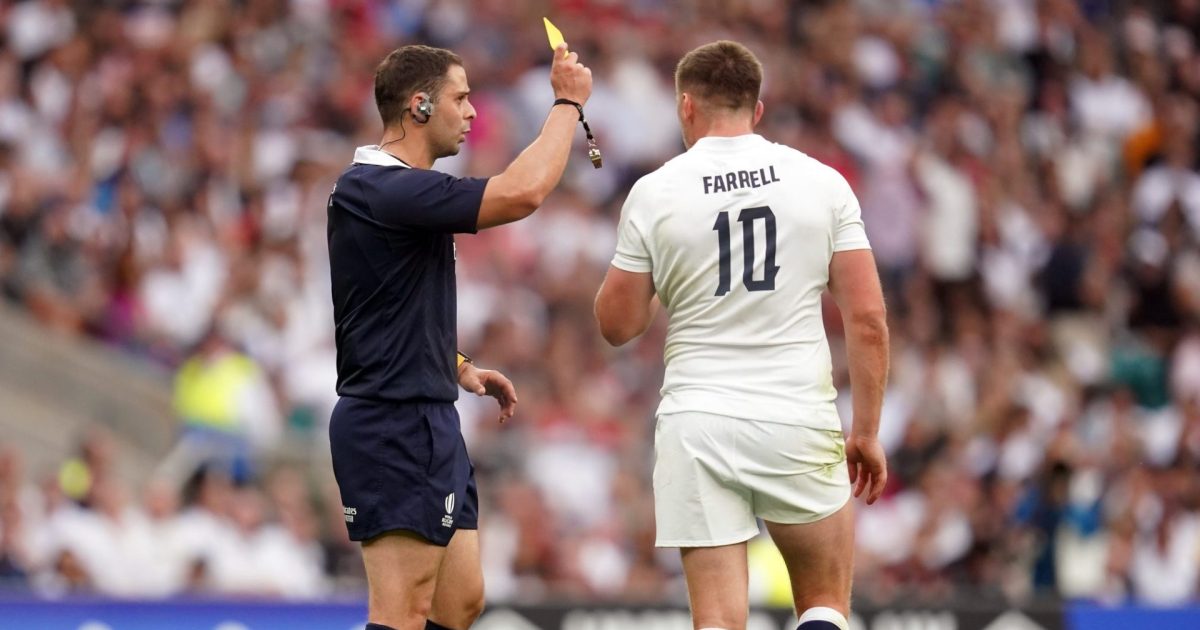World Rugby has officially confirmed that the upcoming Rugby World Cup 2023 in France will see the integration of the Foul Play Review Official – commonly referred to as the ‘Bunker’ – and the shot clock, with the objective of enhancing match officials’ decision-making capabilities and elevating the overall fan experience.
The inclusion of these measures follows successful trials during various prominent rugby tournaments, including the Summer Nations Series, World Rugby U20 Championship, The Rugby Championship, and Super Rugby Pacific.
The Bunker was recently used in the case of red cards for England’s Owen Farrell and Billy Vunipola, who both had yellow cards upgraded in recent warm-up matches against Wales and Ireland respectively.
The decision to implement these innovations across the tournament’s 48 matches was ratified by the international federation’s Executive Board.
Operating from the International Broadcast Centre in Paris, the Foul Play Review Official will be responsible for reviewing contentious foul play incidents that do not exhibit clear and unmistakable red card infractions. Utilizing comprehensive video footage, including advanced Hawk-Eye split screen and zoom technology, the Review Official will have a maximum of eight minutes to examine the incident and communicate their findings to the on-field officials.
Referees will retain their role as the primary decision-makers during matches. However, they will now have the authority to refer potential foul play situations to the Foul Play Review Official in situations where the severity of the offense remains ambiguous. If an incident falls short of an obvious red card violation but meets the threshold for a yellow card, the referee will signal a formal review by crossing their arms. The player involved will be temporarily removed from the field in accordance with the existing sin-bin regulations, lasting for a period of 10 minutes.
The outcomes of the Foul Play Review Official’s assessments will be presented to the stadium audience and television viewers through prominent display on the big screens within the venue and broadcast graphics.
Depending on the Review Official’s determination, the player may either be allowed to resume play with a yellow card upheld, or in the event of a more severe offense, be shown a red card and subsequently barred from further participation in the match.
In addition to the Foul Play Review Official, the Rugby World Cup 2023 will also showcase the implementation of the 2023 Law Application guidelines, inclusive of the shot clock. This digital countdown display will inform players of the time remaining, as stipulated by the laws of the game, for taking conversions and penalty kicks. With an aim to reduce time-wasting and bolster the pace of the game, the shot clock’s countdown will be visible both on in-stadium screens and broadcast feeds.
World Rugby Director of Rugby Phil Davies said: “Rugby World Cup is the pinnacle event in men’s test rugby, a global showcase and an inspiration to millions. The advancement of technology is bringing fans closer to the sport than ever before and helping us create a better, safer spectacle. The Foul Play Review Official process, combined with the Law Application Guidelines, will aid the flow of the game, delivering a better experience, while also supporting match officials reach the right outcomes as quickly as possible.
“I would like to thank all our match officials, the teams and everyone involved in the organisation of tournaments and matches for embracing our vision and getting behind the innovations. Having witnessed the amount of hard work and collaboration, we are looking forward to what promises to be a spectacular Rugby World Cup.”
World Rugby is also introducing a new replacement manager app for match officials, replacing the conventional paper and card system. This technologically advanced app facilitates real-time recording of scoring, replacements, and other vital statistics, contributing to a more streamlined and efficient recording process. The app is available for download on the App Store, accessible to competitions and clubs of all levels.


















































